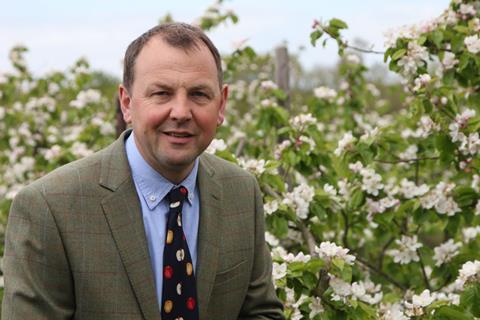British Apples & Pears has set up its research framework for the post-AHDB era

The British topfruit industry has outlined its research and development plans as AHDB completes its wind down.
Trade body British Apples & Pears Ltd (BAPL) has set up its own R&D Group to enable growers to meet the challenges of the future. The group is chaired by Rob Saunders and its members include topfruit growers and agronomists.
The group has agreed to focus on projects that directly address the issues that become more challenging as the crop protection landscape changes. These include woolly aphid, hard-bodied insects, and codling moth. On the disease front, the immediate focus will be on scab and canker.
The first call for research proposals went out in early 2023, and the BAPL R&D Group received shortlisted presentations on 8 March 2023.
Research proposals were evaluated for funding by the group to ensure they offered value for money and had a realistic chance of making a difference for growers, BAPL explained. As a result, some proposals were not accepted.
The research projects the group intends to fund from the first call are to be undertaken by NIAB EMR and ADAS.
NIAB EMR will carry out work on woolly aphid, blossom weevil (anticipating the loss of acetamiprid), codling (in anticipation of the loss of indoxacarb), scab (anticipating the loss of dodine and captan) and canker.
ADAS will undertake work on woodlice, which has become a significant, though localised problem in recent years.
Voluntary subscription
BAPL R&D work will be funded by a voluntary subscription collected at point of sale by the organisation. The proceeds from this subscription also contribute to the EAMU programme run by the newly established Horticultural Crop Protection Ltd.
In addition to raising a modest R&D subscription from its members, BAPL reported that it has been successful in obtaining additional sources of funding to tackle other challenges. For example, it has already started an Innovate UK-funded project (Taking Apple Production to Net Zero), which is primarily a biochar-focused project. BAPL is also seeking other sources of funding for tackling issues such as reducing storage costs and rootstock breeding work.
“The demise of AHDB research is both a threat and an opportunity for the topfruit industry,” Saunders said. “The threat was that without AHDB research the sector would have no mechanism to tackle the pest and disease challenges brought about by regulatory change, climate instability and the arrival of new pests, along with the challenge of our journey to net zero.
“The opportunity was to create a highly focused, grower-led team to identify priorities, invite research tenders, and commission research that has a strong chance of making a difference for topfruit growers.”



